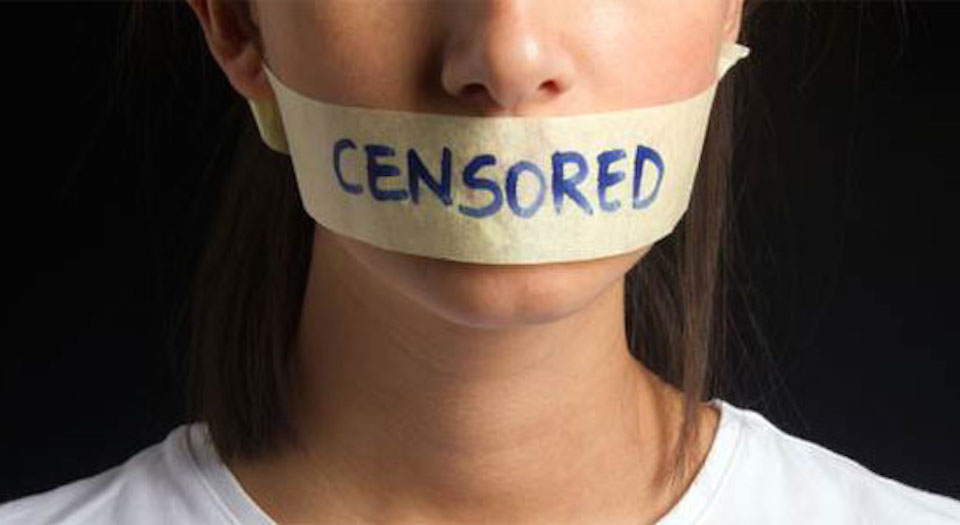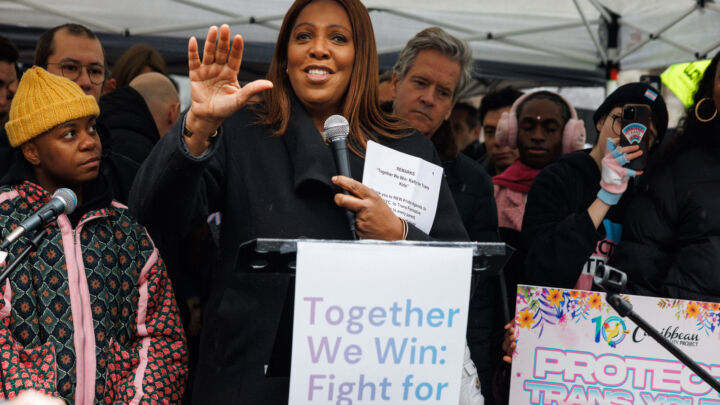The new PC priests of Irish censorship
The church’s war on evil has been replaced by a ‘liberal’ war on hate speech.

Want unlimited, ad-free access? Become a spiked supporter.
On 1 October, at Trinity College Dublin, Angela Nagle of Dublin City University spoke alongside spiked editor Brendan O’Neill in defence of the right to be offensive. Here is what she said.
After Irish Independence, a state body with the unimprovable title of The Commission on Evil Literature was set up, followed shortly after by the Censorship of Publications Act.
Aldous Huxley, Simone de Beauvoir and Edna O’Brien are just some of the authors who were banned under Archbishop McQuaid’s Catholic ethos of heavy state censorship. In 1977, when Magdalene laundries were still running, the iconic feminist magazine Spare Rib was banned by the Irish state.
In other words, all the most challenging, exciting ideas sweeping the world in the twentieth century, emerging from great cosmopolitan intellectual cultures that flourished with the free exchange of ideas, were hidden from Irish people in the name of protecting the vulnerable from harm and offence. The unchallenged rule of a reactionary and corrupt post-independence political elite of church and state created a conspiracy of silence which would have been impossible without the subservient conformist culture inculcated by this safe space of ideas.
When we look back at Archbishop McQuaid now, most young people see only a white privileged male, punching down. This is nothing like our modern enlightened anti-free speech politics, they think. Unlike all the other times in the history of law, when the censors were self-evidently wrong, this time we’re self-evidently right.
But this is pure presentism. McQuaid’s real power came precisely from his ability, and the ability of that generation of reactionary clerical and political leaders, to appoint themselves champions of oppressed Irish Catholics, to weave themselves into an anti-imperialist post-independence national narrative. If you remove some of the moral terminology, like evil and sin, which is now regarded as retrograde and offensive, you’ll find exactly the same reasoning used then and now: the vulnerable must be protected from offence for their own good.
Not long after the banning of Spare Rib in Ireland, the American second-wave feminist movement would begin a campaign of censorship of pornographic material, again in the name of protection of the vulnerable from harm and offence. Today, those same second-wave feminists find themselves at the receiving end of hate campaigns and No Platforming, not from the conservative right, but from the new wave of feminists who claim they are the true protectors of the vulnerable – this time sex workers and transpeople.
But soon it will be something else and then those women will be in the dock, too, because this is not about the vulnerable and it never has been. It’s a power grab by a few extremely nasty individuals who have found a way to bully and emotionally blackmail others, which they would otherwise have to feel bad about, kicking out the old order to become the new.
Noted atheist Richard Dawkins described the blasphemy law in Ireland as ‘wretched, backward and uncivilised’ and he warned it would send Ireland back to the middle ages. Senator Ivana Bacik agreed, arguing that nobody’s beliefs should elevate him or her to any protected position. She called it an ‘outdated anachronism’ that showed Ireland embarrassingly going ‘against the EU norm’. But Bacik has argued for the strengthening of hate-speech legislation to enable criminal convictions. And the celebrated constitutional convention that voted to scrap the blasphemy law also voted to replace it with incitement-to-hatred laws that would include religious hatred – a modern-sounding alternative to blasphemy law that would likely extend the reach of state criminalisation of speech. What a great insight into the mindset of contemporary elites this gives us: The blasphemy law is backward and uncivilised, but strengthening criminalisation of speech on a range of hate-speech grounds is progressive.
Asghar Bukhari of the Muslim Public Affairs Committee [who was also speaking in the Trinity debate] argued, in the aftermath of the Charlie Hebdo killings, that the French government is no champion of free speech, pointing out its many liberal hypocrisies. He was absolutely right. Just look at the mess created by the criminalisation of speech in France. After the Charlie Hebdo journalists were killed for giving offence, the French state responded by arresting Muslims who gave offence to the values of the Republic. This included police interrogation of an eight-year-old Muslim boy who said ‘I am with the terrorists’. Wearing of the veil is banned by the French state in certain public contexts, while Charlie Hebdo still faces being sued for causing offence and Marine Le Pen is facing possible criminal charges for inciting hatred.
Once again, each side, both those who want to censure Charlie and those keen to censor right-wingers or terrorist sympathisers, claims that they are right, that they are on the side of virtue and they are protecting the most vulnerable. Has giving the state the power to criminalise offence banished racism from France? On the contrary, I see a lot of evidence that it is exacerbating the problem on all sides.
Some believe that accepting the right to freedom of speech necessitates political passivity, that when offensive people speak you would have to remain silent or do nothing. But the opposite is the case. Take the energy that you might use stopping others from speaking and use it productively to make your own case using evidence, reason and argument. Use social media, use your college newspaper, write a blog. The answer to hateful speech is more speech, not less. If you haven’t come from an elite school where students are given rhetoric classes and taught to debate and argue, it is even more vital that you expose yourself to all ideas, even the offensive ones, and teach yourself how to write and argue so that you can defend yourself instead of relying on the poisoned chalice of elites doing it for you.
I didn’t always take this view on the right to offend. I’ve spent the past five years studying hateful speech online, and in particular attacks against women. I was ambivalent on the right to offend at first. But through critical thought and self-examination, and through reading the arguments made in defence of free speech, I eventually became convinced of the right to offend. There are many reasons for this, most of which have been well covered in the great canonical works – John Stuart Mill’s On Liberty, John Milton’s Areopagitica and Thomas Paine’s Age of Reason. But I also changed my mind because of the things I observed happening online.
The dynamics of the contemporary social media and in campus life have created a culture of intellectual conformism where anyone who dissents from polite liberal opinion, or even on the most minor points of received and now compulsory dogma, is smeared and attacked. This has also created a reaction, in which what we now call ‘trolls’ anonymously send personal abuse, often of a genuinely disturbing nature, to those they view as representatives of this liberal hegemony. The hurt caused by the trolls is well known. But from what I’ve seen, the safe space of ideas in which dissenters are banished and shamed by the stupid and the power-hungry has also been a disaster for the very people it is supposed to protect.
When they protect you from having to learn to argue, you are robbed of the practice of using reason, robbed of the chance to learn the art of intellectual combat, the ability to spot fallacies in your opponents’ arguments, and in your own. Ultimately you will lose something much deeper: the gift of learning to read widely and think freely. And a life without that is a tragedy for you, not for those who wish to cause you offence.
Angela Nagle is a writer based in Ireland. Her work has appeared in the Irish Times, the Irish Examiner and the Christian Science Monitor.
£1 a month for 3 months
You’ve hit your monthly free article limit.
Support spiked and get unlimited access.
Support spiked – £1 a month for 3 months
spiked is funded by readers like you. Only 0.1% of regular readers currently support us. If just 1% did, we could grow our team and step up the fight for free speech and democracy.
Become a spiked supporter and enjoy unlimited, ad-free access, bonus content and exclusive events – while helping to keep independent journalism alive.
———————————————————————————————————————————–
Exclusive January offer: join today for £1 a month for 3 months. Then £5 a month, cancel anytime.
———————————————————————————————————————————–
Monthly support makes the biggest difference. Thank you.










Comments
Want to join the conversation?
Only spiked supporters and patrons, who donate regularly to us, can comment on our articles.